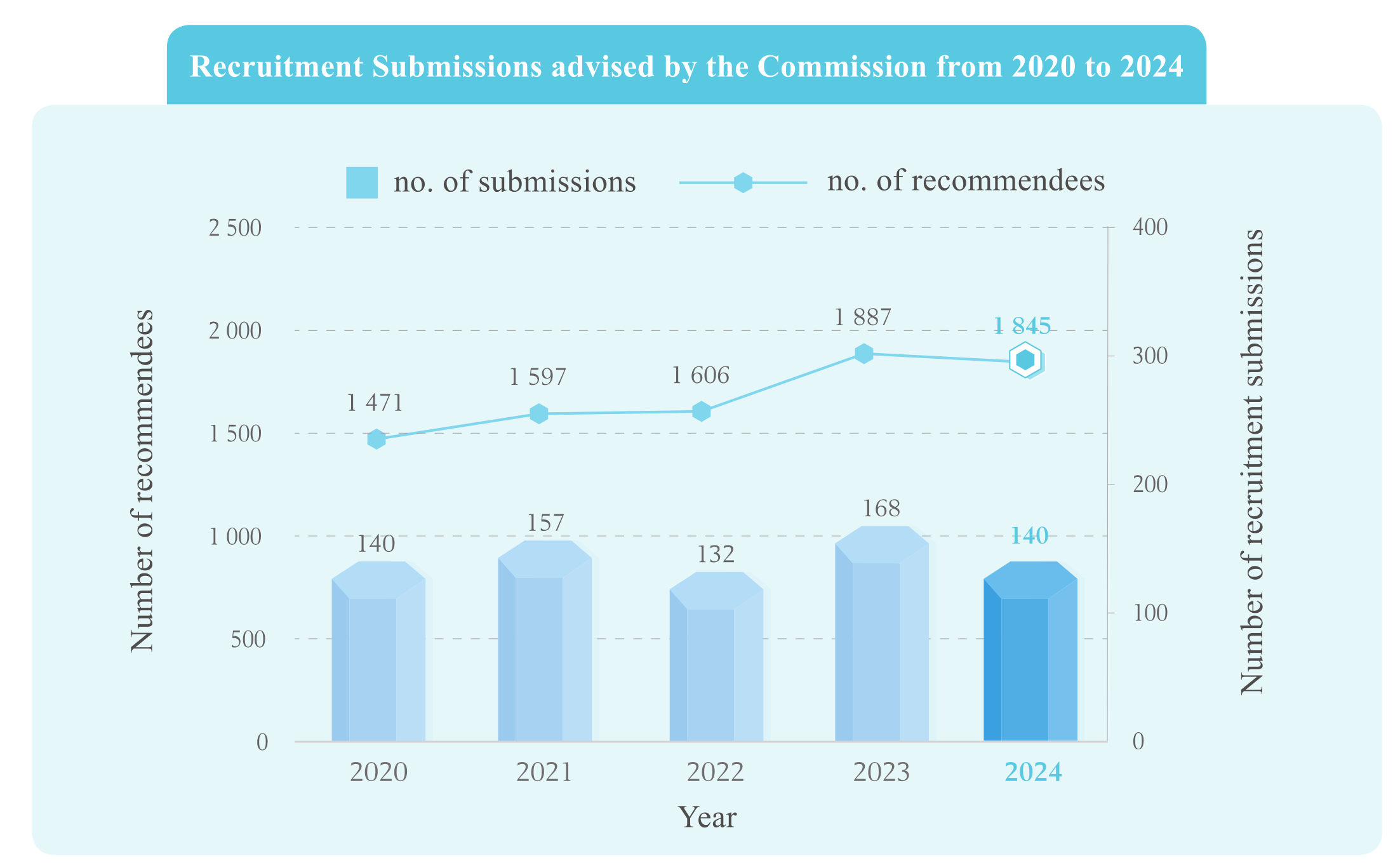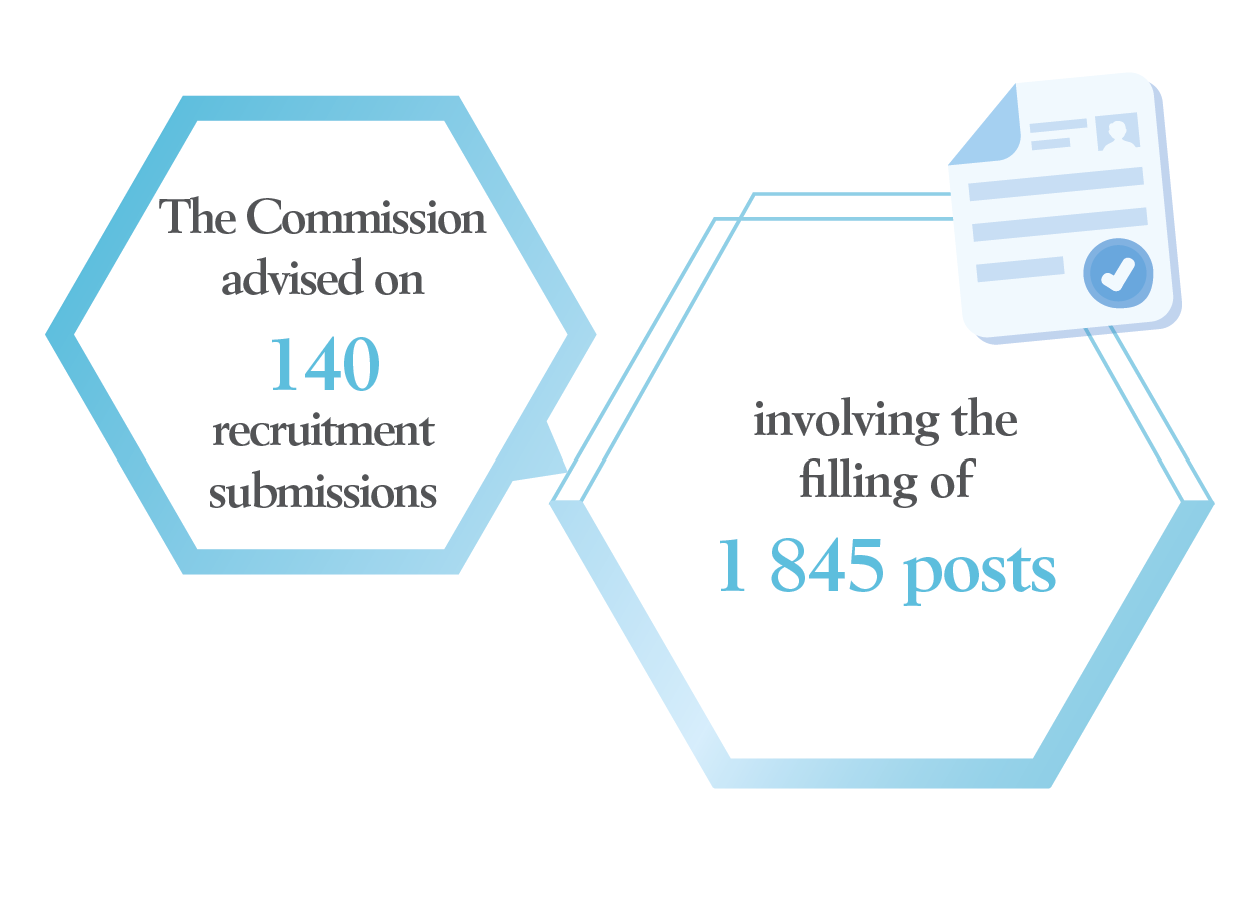In a recent job advertisement, a Department had adopted a long-in-use description of an academic requirement applicable to different disciplines of a grade. The description, however, was too general for the current exercise targetting at specialists holding specific qualifications. It did not take into account the latest changes in the landscape of post-secondary education, particularly new academic programmes recently offered for the relevant profession, leaving much room for varied literal interpretations. The ambiguity was worsened as the other grades in the same Department had adopted the same description of the academic requirement in their job advertisements, but inconsistency in interpretation appeared among different Divisions of the Department.
The Commission noted with concern that the lack of clarity in presenting the academic requirement had attracted queries from both the candidates and serving staff of the relevant Division about the standards and consistency in determining the eligibility.
Taking heed of the Commission’s advice, the Department had conducted a holistic review of the entry requirements for all the grades concerned. Upon review, the Department had fine-tuned the description, elaborating on the expected requirements with details and updates in the light of the different academic qualifications in the prevailing education system. It also standardised the interpretations across the board. We believe what the Department has done will be able to provide clarity for potential job applicants and thus facilitate the recruitment process.
Chapter 3
Chapter 3
Recruitment 
3.1
Recruiting new talents and injecting new blood into the Civil Service is vital in sustaining a stable and robust workforce to achieve the aim of effective and efficient delivery of public service with high quality. B/Ds need to conduct regular recruitment exercises to meet their manpower requirements and service needs. The process of selection is rigorous and competition is keen. The Commission supports the conduct of recruitment based on merit and fair competition so as to select the best-suited candidates for the civil service jobs. Apart from ensuring the proper conduct of the recruitment process, we also attach importance to administrative efficiency so that the Government can compete with the market for talents and good candidates.
Recruitment Submissions Advised in 2024
3.2
In 2024, the Commission advised on 140 recruitment submissions. With years of experience and clear guidelines in place, the Commission was pleased to note that B/Ds had been expediting the recruitment process in general, and recruitment exercises had been conducted in a largely smooth and effective manner. They had also adhered to civil service policies and rules in conducting the recruitment exercises, making appropriate preparations by planning and conducting recruitment exercises in advance of anticipated wastage. The number of recruitment submissions advised by the Commission in the past five years is shown below –

Quality of Recruitment Reports
3.3
During the year, the Commission was also delighted to see that a number of departments had submitted board reports of outstanding quality on their recruitment exercises. In each of their submissions, the recruitment boards concerned had provided pertinent information and well-reasoned assessments of individual candidates’ performance, along with a clear and concise account of the boards’ deliberations. The Commission’s scrutiny of the recommendations was greatly facilitated and efficiency enhanced.
3.4
However, the quality of write-ups on interviewees in board reports from some departments remained inadequate, with the comments on individual interviewees overly brief and generic, making it difficult to distinguish their performance. Although the ratings and scores given were clear and the results unaffected, the Commission has advised the relevant Departments to remind future recruitment boards to provide more specific comments in the written assessments to clearly reflect the performance of candidates so as to support the boards’ recommendations.
Eligibility of Candidates
3.5
Civil service jobs usually offer a lifelong career following an initial observation period, making it essential to appoint only candidates who fully meet the entry requirements and demonstrate the required calibre. To achieve this, it is important for the recruiting departments to clearly and accurately outline their most up-to-date entry requirements in job advertisements and/or vacancy circulars. As the first point of contact with potential job seekers, these advertisements/circulars should be both succinct with adequate details and presented in an unambiguous manner to minimise gaps in expectations and interpretations. The Commission found that there was room for improvement in the presentation and content of the entry requirements prepared by some departments, as illustrated in Cases 3A and 3B below.
Case 3A
Case 3B
In another case, the lack of clearly articulated entry requirements appeared in the
description of the academic subject, causing confusion and false expectation among
some job applicants. While the Department concerned was actually looking for
candidates who had completed tertiary education in a specific subject, it set out
the requirement in a much broader way in its job advertisement, resulting in a large
number of applications from job seekers graduated in other subjects of the relevant
discipline. This attracted complaints from such applicants, who were invited to
selection interviews amidst the qualification assessment process but were ultimately
deemed unqualified for the position due to their failure to meet the specific entry
requirement of the Department.
Interviewing unqualified candidates not only incurs nugatory administrative work, but also causes confusion, false expectation and disappointment for candidates, which will undermine the credibility of the recruitment exercise. By providing clear and concise information regarding the qualifications expected for each position, the Department can prevent misunderstandings and ensure that candidates have a realistic understanding of what is required. Such enhancement will benefit the recruitment process, streamline administrative efforts, and maintain the integrity of the selection outcomes.
The Commission has advised the Department to clearly specify the required qualifications in job advertisements for future recruitment exercises to enhance clarity. We have also reminded the Department to complete the qualification assessment in future recruitment exercises at an earlier stage, whenever possible, especially in cases involving very specific qualification requirements as well as only local qualifications and in-house assessment. This will be conducive to the recruitment efficiency and avoid any false expectation from the job applicants.
Interviewing unqualified candidates not only incurs nugatory administrative work, but also causes confusion, false expectation and disappointment for candidates, which will undermine the credibility of the recruitment exercise. By providing clear and concise information regarding the qualifications expected for each position, the Department can prevent misunderstandings and ensure that candidates have a realistic understanding of what is required. Such enhancement will benefit the recruitment process, streamline administrative efforts, and maintain the integrity of the selection outcomes.
The Commission has advised the Department to clearly specify the required qualifications in job advertisements for future recruitment exercises to enhance clarity. We have also reminded the Department to complete the qualification assessment in future recruitment exercises at an earlier stage, whenever possible, especially in cases involving very specific qualification requirements as well as only local qualifications and in-house assessment. This will be conducive to the recruitment efficiency and avoid any false expectation from the job applicants.
3.6
While recruiting departments, being well-versed in the job requirements, are in the best position to assess applicants’ eligibility, clearly articulating their expectations in advertisements and circulars can help attract the right candidates more effectively and better manage job seekers’ expectations.
Recruiting B/Ds should not lose sight of the importance of updating entry requirements to ensure clarity and to be in line with the evolving landscape in the local education system. Updating the entry requirements is not just a procedural task to ensure effectiveness and efficiency of recruitment exercises, but a vital strategy in keeping our public service dynamic and responsive.
Strengthening Vigilance in Recruitment Process
3.7
The selection of the best-suited
candidates is fundamental to
maintaining the integrity, effectiveness,
and professionalism of the Civil
Service. A rigorous selection process
plays a pivotal role in ensuring that
recruitment exercises are conducted
fairly, transparently, and in strict
adherence to the principles of merit-based
employment. These processes are
not merely administrative formalities,but are critical safeguards to identify
and appoint individuals best equipped
to meet the demands of public service.
Any failure to comply with these
standards not only risks compromising
the quality of appointments but also
undermines public confidence in the
civil service recruitment system. Case 3C
illustrates the paramount importance of
safeguarding the appointment of suitable
candidates to the Civil Service.
Case 3C
After the selection interviews of a recent recruitment exercise, a Department
intended to appoint a former civil servant who had previously served in the same
Department but was ordered by the Department to retire in the public interest under
section 12 of the Public Service (Administration) Order not long ago. While such
critical piece of information could be found in the candidate’s prior employment
record kept by the Department, it was regrettably overlooked during the vetting
process.
Only upon the Commission Secretariat’s request for further information about the recruitment board’s recommendation, the problem was revealed, resulting in the proposed appointment of the candidate concerned being rescinded by the appointment authority after scrutiny of all relevant records. This had unfortunately caused an undue delay in the recruitment process which was entirely undesirable.
The Commission expressed serious concerns to the Department about its apparent negligence in recognising the candidate’s previous retirement record as this exposed significant deficiencies in the vetting process of a recruitment exercise and serious miscommunication among the various units and the recruitment board involved in the recruitment process. Such oversights are totally unacceptable as unsuitable candidates would be appointed to the Civil Service. The failure to act upon known information at the opportune juncture could raise doubts on the integrity of the recruitment practices.
In response to the Commission’s urgent call, the Department has done a comprehensive review on its recruitment process. It has identified various inadequacies and implemented a series of measures to prevent recurrence of similar problems in future so as to safeguard the integrity of the recruitment process.
Only upon the Commission Secretariat’s request for further information about the recruitment board’s recommendation, the problem was revealed, resulting in the proposed appointment of the candidate concerned being rescinded by the appointment authority after scrutiny of all relevant records. This had unfortunately caused an undue delay in the recruitment process which was entirely undesirable.
The Commission expressed serious concerns to the Department about its apparent negligence in recognising the candidate’s previous retirement record as this exposed significant deficiencies in the vetting process of a recruitment exercise and serious miscommunication among the various units and the recruitment board involved in the recruitment process. Such oversights are totally unacceptable as unsuitable candidates would be appointed to the Civil Service. The failure to act upon known information at the opportune juncture could raise doubts on the integrity of the recruitment practices.
In response to the Commission’s urgent call, the Department has done a comprehensive review on its recruitment process. It has identified various inadequacies and implemented a series of measures to prevent recurrence of similar problems in future so as to safeguard the integrity of the recruitment process.
Negligence and miscommunication during a recruitment process not
only compromise procedural integrity but also risk undermining public
trust in the recruitment practices in the Civil Service.
Overcoming Recruitment Challenges in
the Civil Service
3.8
The Commission notes that the Government faces keen competition from the private sector in its efforts to attract and recruit talents into the Civil Service. Recognising that a competitive labour market can pose challenges to recruitment, the Commission underscores the importance of B/Ds in developing effective and targeted recruitment strategies to trawl a wider pool of candidates. In this context, the Commission is encouraged to see the adoption of proactive and flexible approaches by a Department in recruitment, as demonstrated in Case 3D below.
Case 3D
Facing the challenges of recruiting fully-qualified professionals to the Civil Service in recent years, a Department had proactively resumed the conduct of recruitment exercises at the assistant professional level, targeting at graduates or semi-professionals who were still undergoing training or pursuing the relevant professional qualification. Besides, noting that it may take four to five years for a graduate to gain sufficient practical experience and obtain the requisite professional qualification for appointment to the permanent establishment, the Department sought to vary the entry system by allowing newly appointed assistant professionals to serve a longer probationary period, i.e. up to a maximum of five years, where necessary to enable sufficient time for them to acquire the necessary qualification. Any appointee who fails to do so may have his probationary service terminated.
The resumption of recruitment at the assistant professional level with a revised entry system allows the Department to tap a wider array of talents, addressing manpower gaps while fostering long-term development of the grade concerned. Early engagement of the “to-be-qualified” professionals also facilitates mentoring the next generation of leaders at an earlier stage by equipping them with the necessary Government experience as well as professional and management skill-sets to meet the succession needs in the long run.
The Commission appreciates the diligent efforts of the relevant Department in addressing its persistent manpower concerns, while maintaining the professional standards, as well as upholding objectivity and impartiality in recruitment and appointment processes.
The resumption of recruitment at the assistant professional level with a revised entry system allows the Department to tap a wider array of talents, addressing manpower gaps while fostering long-term development of the grade concerned. Early engagement of the “to-be-qualified” professionals also facilitates mentoring the next generation of leaders at an earlier stage by equipping them with the necessary Government experience as well as professional and management skill-sets to meet the succession needs in the long run.
The Commission appreciates the diligent efforts of the relevant Department in addressing its persistent manpower concerns, while maintaining the professional standards, as well as upholding objectivity and impartiality in recruitment and appointment processes.
In keeping with the Government’s endeavours to attract talents,
HoGs/HoDs should think out of the box and take bold steps in formulating their recruitment strategies to recruit talents to meet their manpower needs.

